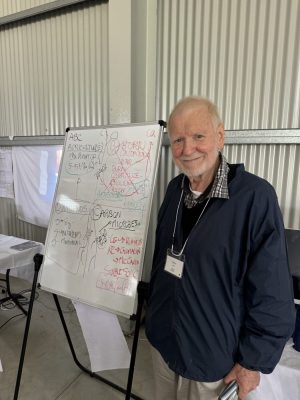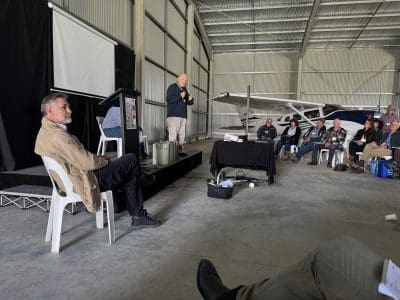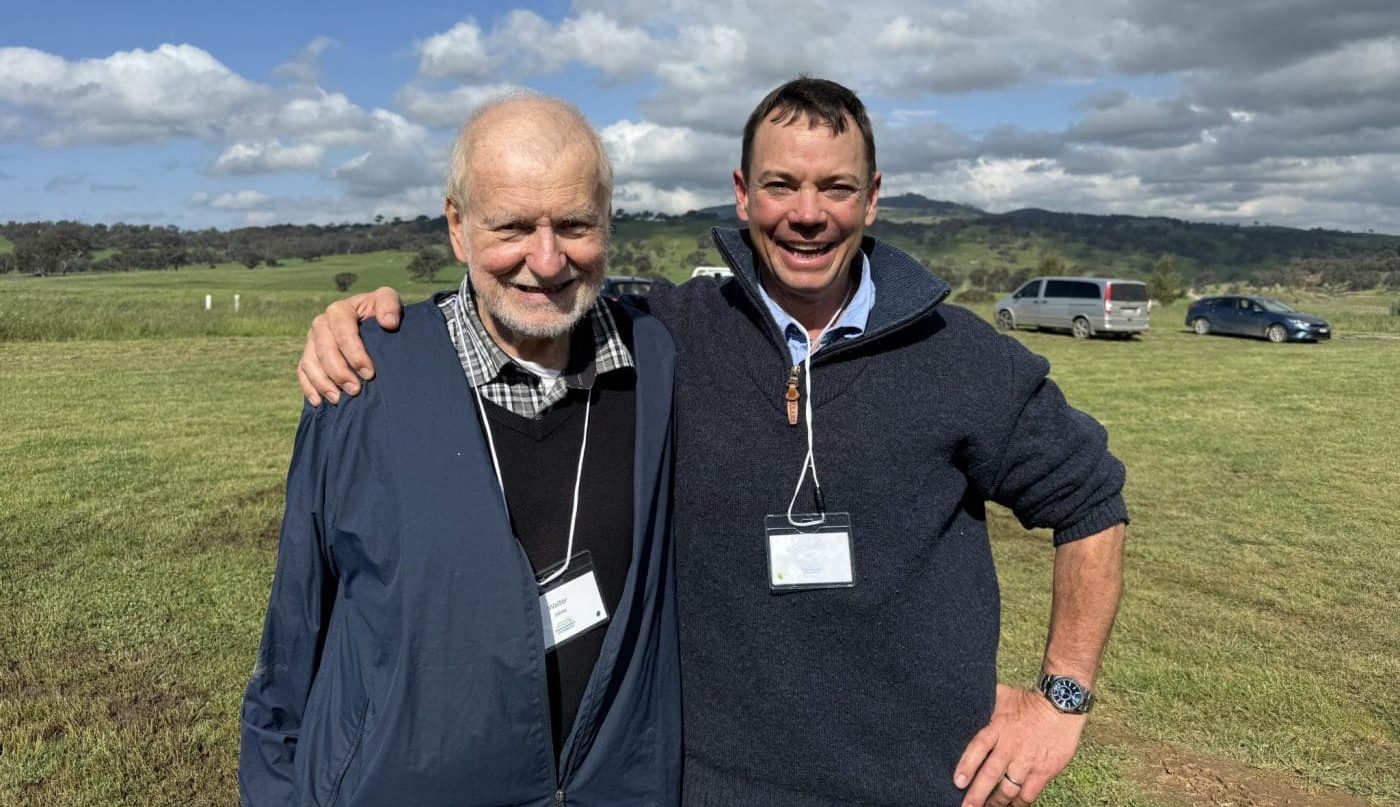Former CSIRO scientist Walter Jehne and George King, Coombing Park, Carcoar, NSW, at last Friday’s field day.
FORMER CSIRO scientist Walter Jehne has emphasised an urgent need to regenerate the earth’s “soil carbon sponge” and the integral role livestock can play in enhancing soil health and water retention.
Addressing an Australian Holistic Management field day at Coombing Park, Carcoar, NSW on Friday, the internationally recognised soil microbiologist explained how livestock management can contribute to sustainable land use and environmental resilience.
 How the landscape is managed in the next 20 years will be “so important for the future”, not just for the environment but for food security also, he said.
How the landscape is managed in the next 20 years will be “so important for the future”, not just for the environment but for food security also, he said.
Central to his message is the concept of the earth’s “soil carbon sponge” – described as porous, well-aggregated soil, rich in plant roots, diverse life forms, nutrient availability, air and often holding lots of water.
Walter told the field day that the carbon sponge is foundational to the biosystems we rely on, influencing hydrology, nutrition, and overall ecosystem health.
He used a hydrograph to illustrate the importance of understanding what happens to rainfall.
In Australia, many soils have been depleted to just 0.3 percent carbon — significantly lower than historical levels of around 10pc.
Instead of absorbing rain, degraded soils lead to rapid runoff, flooding, erosion, and ultimately, desertification.
When the capacity to retain water is lost, land managers are setting themselves up for long-term droughts, he said.
Historical data from the 1840s shows soil carbon levels were significantly higher, with “in soil reservoirs” retaining moisture and maintaining vegetation for longer periods without rain and keeping Australia’s landscapes green and productive.
“Under a lot of agricultural systems, we are growing things, but then we just oxidize it back to CO2, so we have no net benefit.
“We’ve in fact got a negative desertification, in the sense we have generated a human induced drought with more erosion, more damage, more risk, more cost, and wildfires to boot, and all of this stuff is of course oxidising CO2 into the air.
“So when we burn, when we over fertilise, when we use biocides, and when we fallow, basically, we’re oxidising carbon and putting it back to CO2 and this is a tragedy.”
Walter’s message was to move forward from these practices to regenerating through keeping ground cover to sequester carbon into the soil.
He said the soil carbon sponge can be restored with management practices that emphasise improving soil carbon content to at least 3 percent and transforming hydrology to retain more water in the soil and sustain longer lasting vegetation growth.
 Holistic management practices integrating herbivores and manure to stimulate soil microbial health could generate five to eight grass growing cycles from rainfall events.
Holistic management practices integrating herbivores and manure to stimulate soil microbial health could generate five to eight grass growing cycles from rainfall events.
“Your productivity and feeding herbivores through this holistic management is so efficient and so productive. And each time, of course, you’re pumping carbon into the soil.”
Walter said every gram of carbon added to the soil could hold significant amounts of water, facilitating healthier plant growth and removing the need for chemical inputs.
“Every gram of carbon we put into the soil, we know from the physical structure can hold eight grams of extra water in that soil,” he said.
“It also massively increases the availability of nutrients”.
Cattle producer George King, owner of Coombing Park which hosted Friday’s field day, said the rate of agricultural improvement in management over the past 25 years “has been incredible”.
“Farmers generally are becoming better regardless of whether they identify as regenerative or traditional farmers.
“What is changing is the way farmers describe what they are doing, including words like biodiversity, animal welfare, water cycle, conservation etc, which is creating an avenue for connectivity between farmers and consumers.
“What many of the delegates appreciated was the people who had come along the journey for the past 25 years, the importance of community and mentoring.
“Being commodity producers our real world advantage is to control our cost of production, that’s one of the few things we actually can influence.”
Another point that was emphasised at the event was the importance of agriculture working together. “Agriculture is not big enough to be against Agriculture.”




HAVE YOUR SAY